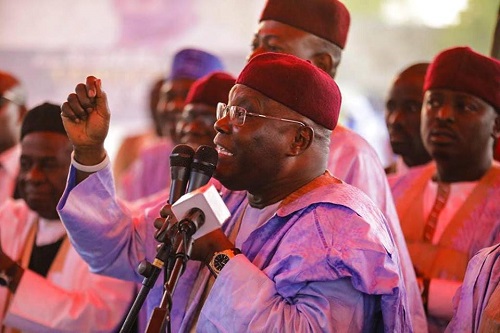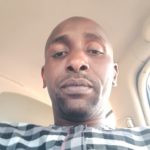FB photo
By
Abba Dukawa
“What is really delaying or suspending any action is the question of proof. I don’t think that is certain. Yes, there is no concrete proof against Atiku. Usually this kind of thing, which is called bad belle in local Nigerian parlance, is done sheepishly by his political detractors that want to pull him down at all costs – Prof Itse Sagay, Chairman, Presidential Advisory Committee against Corruption.
It is imperative to underscore the fact that Atiku is one politician who, before he became the vice president, never held any political appointment, he had all along been a civil servant and when he retired went into private business, which was very successful through his hard work.
His political life began with his meeting Yar’adua While in his office one day, where he was informed that Shehu Musa Yar’adua, former deputy to Obasanjo, was waiting to see him. Yar’adua wanted a license to import beans from Niger Republic for sale in Nigeria. He told him that he would have to write an application to President Ibrahim Babangida for the license. Yar’adua thanked him and left. Babangida approved his application. Yar’adua imported the beans from Niger Republic, sold them and made good money. He felt he needed to show appreciation to Atiku for assisting him. He was happy to see him again when he visited Atiku and happier still to know that his business had gone well. He offered Atiku a token of appreciation, but he declined, saying it was unnecessary. “I was just doing my job.”
In May 1989, the Babangida administration finally lifted the ban on party politics. The Yar’adua group immediately unveiled its political association, the People’s Front of Nigeria (PFN), which had “the pursuit of justice, peace, and service” as its motto and “People first” as its slogan, the rest being history.
His political carrier started a year before his retirement; he had started attending political meetings at Shehu Yar’adua house in Ikoyi, Lagos. “Look, you are good, you relate well with people. I think you will make a good politician. Why don’t you join me in politics,” Shehu Musa Yar’adua said to Atiku Abubakar one day. That was how it all started. The Yar’adua Group, as came to be known, wanted to build a bridge across the old fault lines of ethnicity, religion and region. President Babangida announced that his Armed Forces Ruling Council had decided not to register any of the associations because, as he put it, “the associations were set up by the same old discredited politicians who must never be allowed back in power”. The 13 associations werte disbanded and two new parties – the Social Democratic Party (SDP) and the National Republican Convention (NRC) created. He asked politicians to join either of the two. Those in the Yar’adua group decided to join the Social Democratic Party (SDP), the party considered closer to the PFN in ideological orientation.
In November 1991 six people contested gubernatorial seat with Atiku under Social Democratic Party (SDP). He was declared winner but Bala Takaya and his supporters protested. It was amidst this chaos that in December 1991, the Babangida administration announced the cancellation of nine state primary election results, including that of Adamawa. Takaya and Atiku were also disqualified from contesting the upcoming governorship election.
On June 12 the Babangida administration annulled the election midway into the vote count. Politicians were all sad and angry about the annulment and tired of the endless transition. In the end, a compromise was reached to form an Interim National Government (ING) with corporate chieftain Ernest Shonekan as Head. The ING was sacked three months later by General Sani Abacha, the rest remaining history.
Due to his opposition on the military rule of the late General Abacha, State Security Service (SSS) seized his international passport as he was making plans to travel outside the country to cool off and seek the support of some political and business leaders in Europe and the United States for the democratic struggle in Nigeria. Atiku obtained another passport in the name of Atiku Kojoli. On August 19, 1998, the PDM and other groups came together to form the People’s Democratic Party (PDP) as “a credible, nationwide, people-oriented and principled political party, enjoying the widest support throughout the Federal Republic of Nigeria”. “I led a small group to identify a presidential candidate from the South-west that we could support.”
General Abdul Salami’s regime, after the death of General Abacha, released political detainees and announced a short transition to the civil rule programme. Alhaji Atiku Abubakar returned and went back to Adamawa to realize his long-time dream of governing his state. He was unanimously picked as the PDP governorship candidate for Adamawa State and Wazirin Adamawa won the January 9, 1999 governorship election.
Following the emergence of Obasanjo as presidential candidate, Abubakar’s military regime sent an emissary to inform them that they wanted Olusegun Obasanjo. In the end, the PDM agreed to support Obasanjo’s candidacy. A contact team was set up with Lawal Kaita, Sunday Afolabi, Ango Abdullahi, Titi Ajanaku and Atiku as members.
They were convinced that Obasanjo would make a good President. After Obasanjo agreed to contest the PDP presidential primary, Atiku went back to Adamawa to realize his long-time dream of governing his state. Atiku was unanimously picked as the PDP governorship candidate for Adamawa State. Boni Haruna was Atiku running mate. Turakin Adamawa, as he was then, won the January 9, 1999 governorship election, defeating his perennial rival, Bala Takaya of the All People’s Party.
The PDP held its national convention in Jos in January 1999 and Obasanjo defeated former Vice President Alex Ekwueme to become the party’s candidate. Obasanjo chose him as his Vice Presidential candidate. Atiku was quite surprised as he had not shown any interest in the position. Waziri Adamawa wanted to govern his home state but that was not God’s will.
In 2003 the relationship between Obasanjo and Atiku deteriorated, the former president launching a smear campaign against Atiku’s image. Obasanjo and his co-conspirators accused him of being rich but the money he had was the money he made in private business before he became vice president. Since 2007 Atiku Abubakar left office, he has been without immunity, why therefore has he not been prosecuted before any competent court of jurisdiction, successive administrations not prosecuting Atiku if there were corruption charges against him? Even Buhari’s government that mouths anti-corruption platitudes has not been able to pin him down on any corruption charges. The People’s Democratic Party presidential aspirant Atiku Abubakar is the politician accused most of being very corrupt, right from the time of Obasanjo smearing Atiku’s image to stop him from succeeding him in 2007.
Some have even argued that he made so much money from the privatization exercise because he was chairman of the National Economic Council; even people that make such frivolous statements are asked to mention in specific terms the companies he has cornered personally or through proxies, and are usually unable to substantiate their spurious claims.
It is imperative to underscore the fact that Atiku is one politician who before he became vice president, never held any political appointment, he had all along been a civil servant and when he retired, went into private business. Much more important is the fact that even as the vice president he never awarded contracts and had no direct access to public funds,in fact losing more money in government than when he was in private business. The money he has is the money he made in private business before he became the vice president.
Some have gone to the extent of saying that he made his money through dubious means or by fraudulent practices, and the response of the vice president has always been that if anybody, anywhere has any evidence that he was engaged in any unwholesome dealings, at any stage of his life, they should go to court. He has also repeatedly subjected himself to public scrutiny at all times, exuding uncommon confidence that his track record is impeccable. Haters forget that the only constitutional role assigned to the office of the Vice President is the chairmanship of the National Economic Council (NEC), a meeting made up of the 36 governors of the Federation, CBN Governor, and Minister of Finance, etc. The National Economic Council plays an advisory role just like the National Council of States forum as its decisions or resolutions are not binding on the President who is the chief executive of the country.
Indeed, if Nigerians vote for Waziri of Adamawa to be elected as the president with his experience, he will govern the country through a leadership that is committed to rapid socio-economic transformations through people-oriented policies and programmes tailored towards sustainable and integrated development. It is imperative to once again underscore the fact that Atiku is one politician who before he became the vice president, never held any political appointment, he had all along been a civil servant and when he retired he went into private business, which was very successful by the grace of God and dint of hard work.
Abba Dukawa
A Kano based media practitioner and public commentator for 13 years with many articles published by a number of online mediums and print media.



No Comments Yet!
You can be first to comment this post!